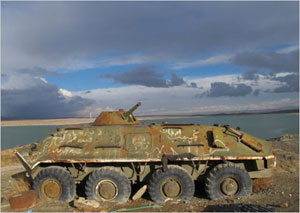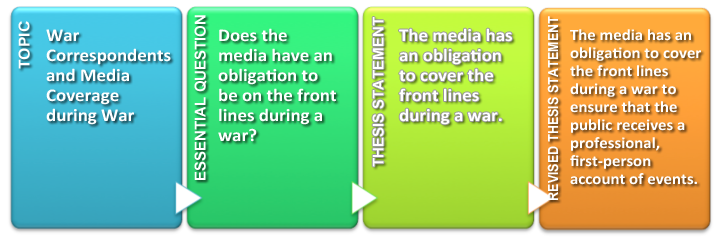
Source: New York Times Knowledgebase, C. J. Shivers
Once the thesis is written, we need to ask these questions: Why do I feel the way I do about the issue? What facts, statistics, examples, quotations, anecdotes, or expert opinions support my view? What reasons will convince my readers that my position is the best one? What evidence can I present to answer their objections?
Thesis Statement: The media has an obligation to cover the front lines during a war.
If we incorporate reasons into the thesis statement, it will make the statement stronger. The reasons will explain why our position is worth considering.
|
Reason 1 |
Reason 2 |
|---|---|
|
We can get first-person accounts of events rather than hearsay.
|
Civilian reporting of soldier’s accounts and stories can be good, but professional journalists are trained to gather and report the news more objectively.
|

To be convincing, you need to provide strong reasons or justification to support your position. Each reason should be different and supported with evidence. Reasons get their strength from the evidence that supports them. Effective evidence is relevant because it is clearly related to the issue.
|
Support for Your Argument |
What It Looks Like |
|
|---|---|---|
|
Statistics |
Facts that are stated in numbers |
219 correspondents were embedded among troops in 2007. |
|
Examples |
Specific instances that explain points in the essay |
War correspondents may undergo additional training to prepare them for the front lines. |
|
Observations |
Events or situations that you have witnessed |
Having correspondents in the field with troops seems to ensure accuracy in reporting the news. |
|
Anecdotes |
Brief stories that illustrate points |
My grandfather says that when he was serving in Vietnam, reporters were as tough as soldiers. |
|
Quotations |
Direct statements from authorities on the topic |
General Powell said, “Turn your attention to television because you can win the battle or lose the war if you don’t handle the story right.” |
|
Analogies |
Comparisons that show similarities between otherwise unrelated ideas |
War correspondents are like tailors stitching stories together to form a whole. |
|
Commonly accepted beliefs |
Ideas that most people share |
Most people recognize that reporting on the front lines is dangerous. |
Four Questions Strategy
The Four Questions Strategy will help you figure out the reasons that support your position. The questions won’t necessarily provide the topic of each paragraph, but they will help you organize your ideas and supporting reasons. Read through the following four questions and the sub-questions that result from each one:
- Define the problem – What is the issue at hand? What is the history of the problem? In this case, the issue is about whether journalists should report from the front lines of war. This problem could lead us to ask the following: do war correspondents have an obligation to report on war from the front lines?
- Get Specific – Now that you have a general idea about the topic, what will be the SPECIFIC FOCUS? To get to this point, you will likely need to brainstorm or freewrite. We might use these questions to help us brainstorm:
- How do war correspondents train for the front lines?
- How many war correspondents are reporting from the front lines on any given day?
- How does the U.S. compare to other countries in reporting from the front lines during times of war?
- Take a Stand – What is your opinion on the issue or problem? Based on what we know so far, we are taking this position: The media have an obligation to be on the front lines during a war.
- Address Counterarguments – Who disagrees with my thesis and why? You must address the counterargument of those who disagree with your opinion. Let’s address counterarguments in our essay by answering this question: Why would people think war correspondents endanger soldiers?
Your Turn

Pen and paper, Phil Gyford, Flickr
Now you’re ready to begin organizing the structure of your persuasive essay. Remember that a powerful persuasive essay can change people’s minds, inspire others to take action, and actually make a difference in the world!
Assignment: Pretend that you are writing about this topic for an in-class essay and that you won’t be allowed to do library research.
Teachers should limit the amount of homework they assign to 30 minutes per class.
- First, think about the essential questions from earlier in this lesson. (The chart has been supplied below.) Use the questions to help you decide your position and create a working thesis.
-
Download or print the “Thesis and Final Four” handout. Use the Four Questions Strategy to plan the four reasons that will support your thesis statement. Note: The last question on the handout has been filled in for you as an example of how to address the counterarguments and anticipate objections.
- Testing Tip: Persuasive essays can vary in length. Keep in mind that your topic needs to be addressed within the parameters of your testing directions. Sometimes in a testing situation, you won’t be able to do research. Look at the essential questions chart below and determine which of the examples of evidence you could use when research isn’t possible.
|
Start |
Reason |
Example |
|---|---|---|
|
Which One |
Collect information to make an informed choice |
Which twentieth-century president did the most to promote civil rights? |
|
How |
Understand problems and perspectives, weigh options, and propose solutions |
How should we solve the problem of water pollution in our neighborhood? |
|
What if |
Use knowledge to propose a hypothesis and consider options |
What if everyone refused to eat meat containing hormones and antibiotics? |
|
Should |
Make a moral or practical decision based on evidence |
Should we clone humans? |
|
Why |
Understand and explain relationships to capture the essence of a complicated issue |
Why should plastic bags be banned from retail and grocery stores? |